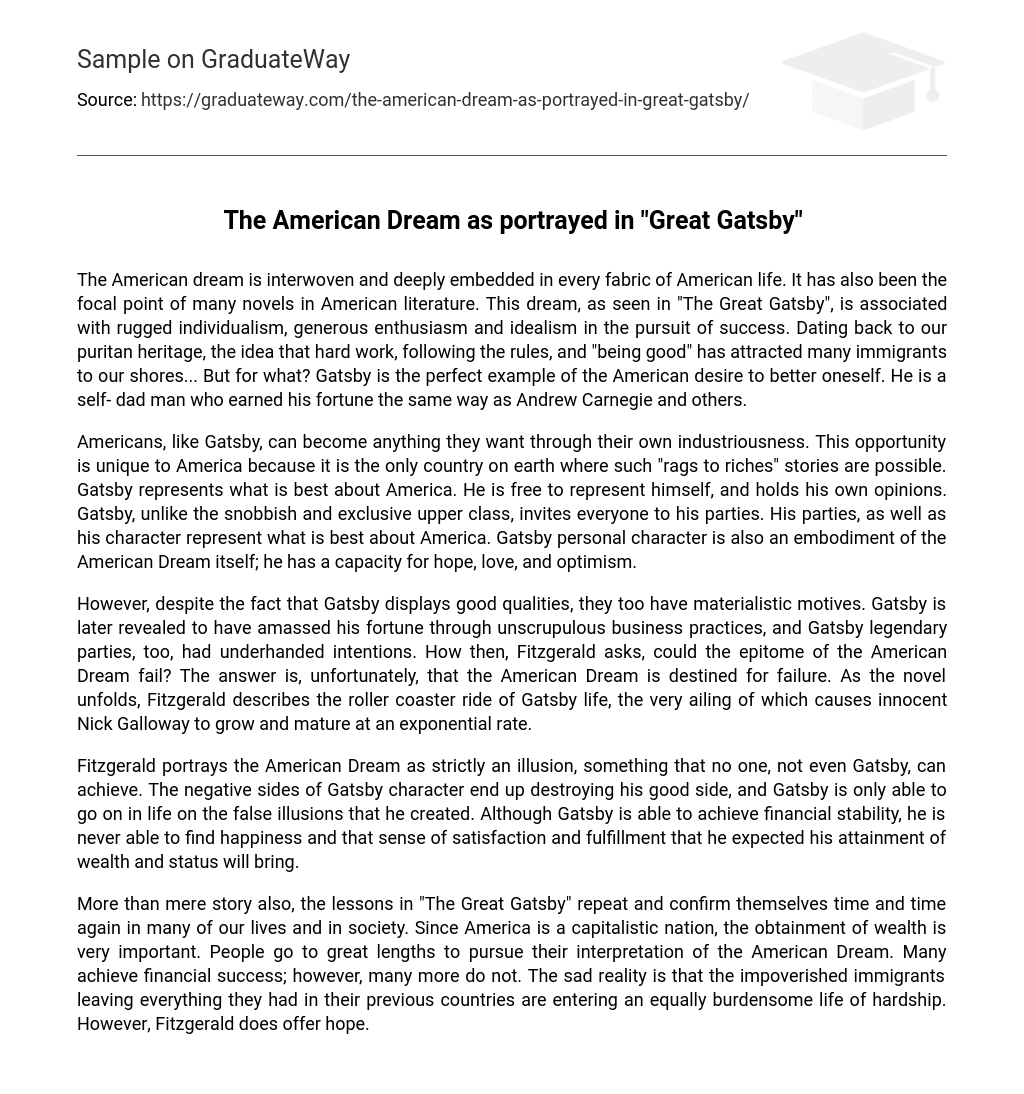The American dream is interwoven and deeply embedded in every fabric of American life. It has also been the focal point of many novels in American literature. This dream, as seen in “The Great Gatsby”, is associated with rugged individualism, generous enthusiasm and idealism in the pursuit of success. Dating back to our puritan heritage, the idea that hard work, following the rules, and “being good” has attracted many immigrants to our shores… But for what? Gatsby is the perfect example of the American desire to better oneself. He is a self- dad man who earned his fortune the same way as Andrew Carnegie and others.
Americans, like Gatsby, can become anything they want through their own industriousness. This opportunity is unique to America because it is the only country on earth where such “rags to riches” stories are possible. Gatsby represents what is best about America. He is free to represent himself, and holds his own opinions. Gatsby, unlike the snobbish and exclusive upper class, invites everyone to his parties. His parties, as well as his character represent what is best about America. Gatsby personal character is also an embodiment of the American Dream itself; he has a capacity for hope, love, and optimism.
However, despite the fact that Gatsby displays good qualities, they too have materialistic motives. Gatsby is later revealed to have amassed his fortune through unscrupulous business practices, and Gatsby legendary parties, too, had underhanded intentions. How then, Fitzgerald asks, could the epitome of the American Dream fail? The answer is, unfortunately, that the American Dream is destined for failure. As the novel unfolds, Fitzgerald describes the roller coaster ride of Gatsby life, the very ailing of which causes innocent Nick Galloway to grow and mature at an exponential rate.
Fitzgerald portrays the American Dream as strictly an illusion, something that no one, not even Gatsby, can achieve. The negative sides of Gatsby character end up destroying his good side, and Gatsby is only able to go on in life on the false illusions that he created. Although Gatsby is able to achieve financial stability, he is never able to find happiness and that sense of satisfaction and fulfillment that he expected his attainment of wealth and status will bring.
More than mere story also, the lessons in “The Great Gatsby” repeat and confirm themselves time and time again in many of our lives and in society. Since America is a capitalistic nation, the obtainment of wealth is very important. People go to great lengths to pursue their interpretation of the American Dream. Many achieve financial success; however, many more do not. The sad reality is that the impoverished immigrants leaving everything they had in their previous countries are entering an equally burdensome life of hardship. However, Fitzgerald does offer hope.
Perhaps, he used Gatsby to send a message to American society. Not to say that they were immoral, corrupt and hopeless, but instead to inspire change. Unlike the story of Gatsby, much of our own stories today are still unwritten. The story of the American dream that has come to be perverted by the emphasis on wealth and status, can still reformed through a spiritual quest for authenticity and integrity. The faster we can all learn and incorporate the moral lesson from Gatsby life; the better we will come to understand that the greatest happiness and rapture comes from within.





